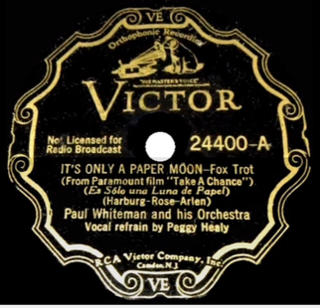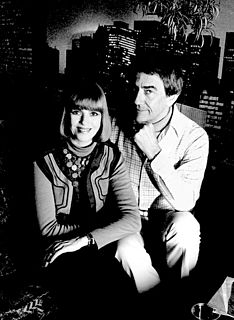"Something's Gotta Give" is a popular song with words and music by Johnny Mercer in 1954. It was published in 1955. It was written for and first performed by Fred Astaire in the 1955 musical film Daddy Long Legs, and was nominated for an Academy Award in 1955 as Best Original Song, losing to "Love is a Many Splendored Thing".
"Out of This World" is an American popular song composed by Harold Arlen, with lyrics written by Johnny Mercer. It was first recorded by Jo Stafford with Paul Weston and his Orchestra in 1944.

"It's Only a Paper Moon" is a popular song published in 1933 with music by Harold Arlen and lyrics by Yip Harburg and Billy Rose. It was originally titled "If You Believed in Me," but later went by the more popular title "It's Only a Paper Moon." The song was written for an unsuccessful 1932 Broadway play called The Great Magoo that was set in Coney Island. Claire Carleton first performed this song on December 2, 1932. It was used in the movie Take a Chance in 1933 when it was sung by June Knight and Charles "Buddy" Rogers. Paul Whiteman recorded a hit version which was released in 1933 featuring Bunny Berigan on trumpet. Another popular recording in 1933 was by Cliff Edwards.
"The Gypsy in My Soul" is a popular song written for the 50th anniversary of the University of Pennsylvania Mask and Wig show in 1937 by two Penn graduates, Clay Boland and Moe Jaffe. Boland wrote the music and Jaffe the lyrics. Although both men had long since graduated, it had become the practice at the time for professionals, rather than students, to compose songs for the show.
"This Can't Be Love" is a show tune and a popular song from the 1938 Rodgers and Hart musical The Boys from Syracuse when it was sung by Eddie Albert and Marcy Westcott. The lyrics poke fun at the common depiction of love in popular songs as a host of malignant symptoms, saying, "This can't be love because I feel so well."
"It's Easy to Remember " is a popular song written by Richard Rodgers with lyrics by Lorenz Hart, published in 1935, written for the 1935 film Mississippi starring Bing Crosby and W.C. Fields. Crosby introduced the song in the film and his recording for Decca Records made on February 21, 1935 with Georgie Stoll and his Orchestra and Rhythmettes and Three Shades of Blue topped the charts of the day. Crosby recorded the song again in 1954 for his album Bing: A Musical Autobiography.
"I've Got The World on a String" is a 1932 popular jazz song composed by Harold Arlen, with lyrics written by Ted Koehler. It was written for the twenty-first edition of the Cotton Club series which opened on October 23, 1932, the first of the Cotton Club Parades.
"Let's Call the Whole Thing Off" is a song written by George Gershwin and Ira Gershwin for the 1937 film Shall We Dance, where it was introduced by Fred Astaire and Ginger Rogers as part of a celebrated dance duet on roller skates. The song is most famous for its "You like tomato / And I like tomahto " and other verses comparing their different regional dialects.
Paul Thatcher Smith was an American jazz pianist. He performed in various genres of jazz, most typically bebop, but is best known as an accompanist of singers, especially Ella Fitzgerald.
"I Wished on the Moon" is a song composed by Ralph Rainger, with lyrics by Dorothy Parker. Bing Crosby sang the song in The Big Broadcast of 1936.
"They All Laughed" is a song composed by George Gershwin, with lyrics by Ira Gershwin, written for the 1937 film Shall We Dance where it was introduced by Ginger Rogers as part of a song and dance routine with Fred Astaire. The lyrics compare those who "laughed at me, wanting you" with those who laughed at some of history's famous scientific and industrial pioneers, asking, "Who's got the last laugh now?" People and advances mentioned are Christopher Columbus's proof the earth is round; Thomas Edison's phonograph; Guglielmo Marconi's wireless telegraphy; the Wright brothers's first flight; the Rockefeller Center; Eli Whitney's cotton gin; Robert Fulton's North River Steamboat; Milton S. Hershey's Hershey bar chocolate; and Henry Ford's "Tin Lizzy" Model T car.
"Would You Like to Take a Walk?" is a popular song with music by Harry Warren and lyrics by Mort Dixon and Billy Rose. It was added to the 1930 Broadway show Sweet and Low starring James Barton, Fannie Brice and George Jessel. The song was published in 1930 by Remick Music Corporation.
"Isn't It a Pity?" is a song composed by George Gershwin, with lyrics by Ira Gershwin, written for the unsuccessful 1933 musical Pardon My English. It was introduced by George Givot and Josephine Huston.
"This Time the Dream's on Me" is a song composed by Harold Arlen, with lyrics by Johnny Mercer. It was written for the 1941 film Blues in the Night when it was sung by Priscilla Lane.
"When the Sun Comes Out" is a song composed by Harold Arlen, with lyrics written by Ted Koehler, in 1941. It was introduced in 1941 by Helen O'Connell with the Jimmy Dorsey Orchestra.
"Get Happy" is a song composed by Harold Arlen, with lyrics written by Ted Koehler. It echoes themes of a Christian evangelical revivalist meeting song.
"I Let a Song Go Out of My Heart" is a 1938 composition by Duke Ellington, with lyrics added by Irving Mills, Henry Nemo and John Redmond. The song became a number one hit for Ellington in 1938. Other hit versions the same year were by Benny Goodman, Connee Boswell, Hot Lips Page, and Mildred Bailey.
"It's All Right With Me" is a popular song written by Cole Porter, for his 1953 musical Can-Can, where it was introduced by Peter Cookson as the character Judge Aristide Forestier.
"Mountain Greenery" is a popular song composed by Richard Rodgers, with lyrics by Lorenz Hart for the musical The Garrick Gaieties (1926).
"Between the Devil and the Deep Blue Sea" is an American popular song published in 1932, with music by Harold Arlen and lyrics by Ted Koehler, and first recorded by Cab Calloway in 1931. It was introduced in the 1931 Cotton Club show Rhythmania and is now a widely recorded standard.



